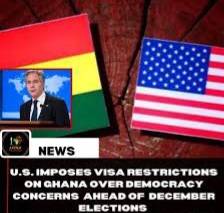US Announces Visa Restrictions for Ghana
In a significant diplomatic move, the United States government has announced visa restrictions for certain Ghanaian officials, citing concerns related to illegal immigration and the failure to address issues of repatriation. This decision has raised eyebrows and sparked discussions about its implications for Ghana-US relations, as well as its impact on Ghanaians seeking to travel to the US.
The visa restrictions target specific individuals within the Ghanaian government who are believed to be involved in facilitating illegal immigration. This includes officials who may have failed to cooperate with US immigration authorities in the repatriation of Ghanaian nationals who have overstayed their visas or violated immigration laws. The US State Department emphasizes that this action is not aimed at the broader Ghanaian population but is a targeted measure designed to hold specific individuals accountable for their roles in these issues.
Officials from the US have expressed concerns that Ghana has not sufficiently addressed the problem of undocumented Ghanaians living in the US. The failure to repatriate these individuals, especially those who have been denied asylum or other forms of legal residency, has prompted the US to take action. This development underscores the broader challenges of managing immigration and ensuring compliance with legal frameworks on both sides.
The announcement has elicited mixed reactions within Ghana. Some government officials have expressed disappointment, viewing the restrictions as a setback in the otherwise cordial relationship between the two nations. They argue that such measures could hinder efforts to strengthen ties, particularly in areas like trade, security, and development assistance. Ghanaian authorities have called for dialogue to resolve the underlying issues and maintain constructive relations with the US.
On the other hand, many Ghanaians see the restrictions as a necessary step to address a pressing problem. Illegal immigration is a complex issue that affects both the US and Ghana. For many Ghanaians, the desire to migrate stems from economic challenges and the pursuit of better opportunities abroad. However, the risks associated with undocumented status can lead to significant hardships, including the potential for deportation and the separation of families.
The visa restrictions also raise questions about the future of Ghanaian nationals seeking to travel to the US for education, business, or family reunification. Increased scrutiny could lead to more rigorous application processes, making it more difficult for individuals to obtain visas. This situation could exacerbate existing challenges for students and professionals looking to further their education or careers in the US.
To mitigate the impact of these restrictions, Ghanaian officials may need to engage in diplomatic efforts to address US concerns. This could involve enhancing cooperation on immigration issues, improving repatriation processes, and ensuring that Ghanaians who travel to the US do so legally. By demonstrating a commitment to resolving these challenges, Ghana may be able to restore confidence and improve the situation for its citizens.
In conclusion, the US visa restrictions on Ghanaian officials mark a significant development in bilateral relations, highlighting the complex dynamics of immigration and accountability. As both nations navigate this issue, it is crucial for Ghana to take proactive steps to address US concerns while also protecting the interests of its citizens. The future of Ghana-US relations will depend on their ability to engage in constructive dialogue and find mutually beneficial solutions to the challenges at hand.


